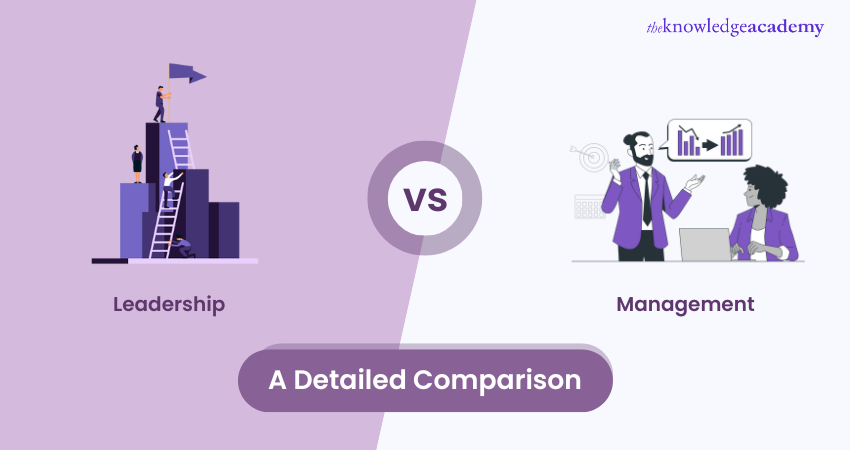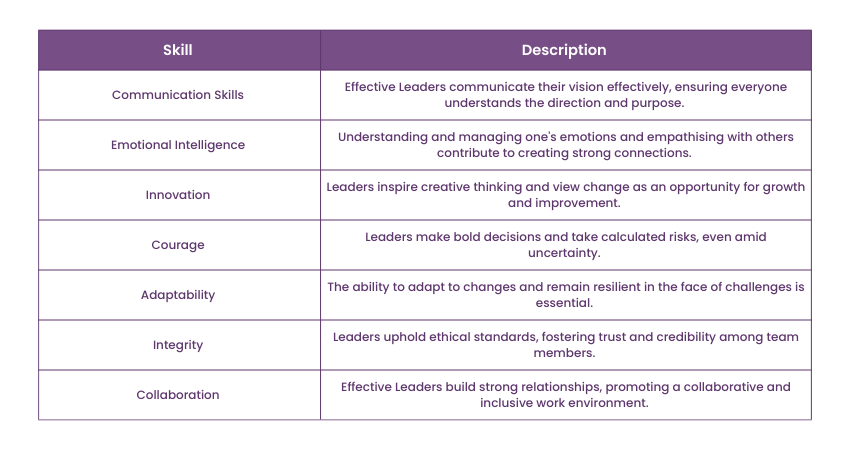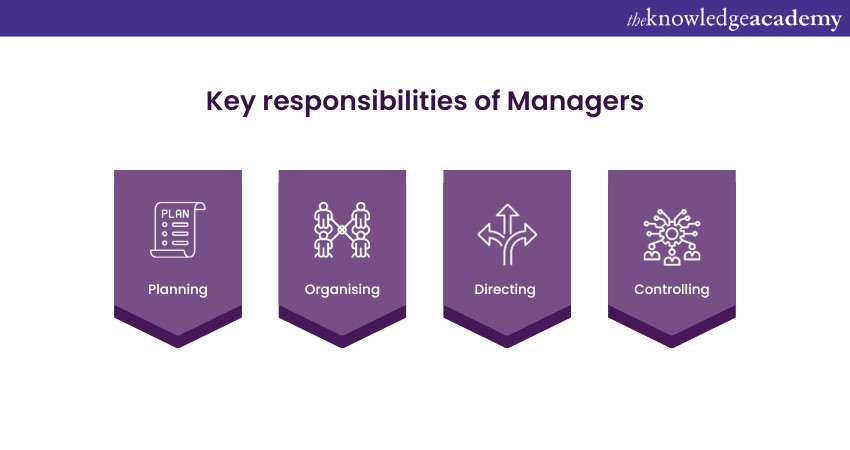We may not have the course you’re looking for. If you enquire or give us a call on 01344 203999 and speak to our training experts, we may still be able to help with your training requirements.
Training Outcomes Within Your Budget!
We ensure quality, budget-alignment, and timely delivery by our expert instructors.

Have you ever wondered what truly sets leaders apart from managers in an organisation? In today's fast-evolving workplace, understanding the differences between leadership and management is not just a choice; it’s a necessity. While many use these terms interchangeably, they represent distinct pillars that uphold a business's structure and drive its progress.
By grasping their unique characteristics and roles, you'll see how they work together to foster success. In this blog, we’ll explore a detailed comparison between leadership and management and the distinct traits of leaders and managers. Let’s begin this exploratory journey!
Table of Contents
1) What is Leadership?
2) What is Management?
3) Leadership and Management: What’s the Difference?
4) Leadership vs Management: What’s the Similarities?
5) How to Develop Leadership and Management skills?
6) Leadership vs Management: Which one is Important?
7) Conclusion
What is Leadership?
Leadership, regardless of role—whether Executive, Manager, Sports Coach or Schoolteacher—is about directing and influencing outcomes. It involves motivating groups to achieve what they couldn’t accomplish individually. The one crucial aspect of leadership is that it is defined by actions rather than titles. Some individuals in formal Leadership roles may lack effective Leadership qualities, while others without formal authority can inspire trust and energy through their actions.
Moreover, it's essential to understand that leadership is not a natural attribute but a skill that can be developed. Its core lies in its mindsets, which are observable behaviours that lead to measurable outcomes. Check below to explore the key responsibilities of a great leader, covering several crucial subtopics that can be beneficial to you:
Key Responsibilities of Leaders
Leaders carry numerous responsibilities depending on the organisations in which they work. Yet, there are a few standard responsibilities that remain constant for every business. Let us explore some of those key responsibilities in the below section:
a) Vision Creation: Leaders envision a future state and communicate a clear, inspiring vision to their teams.
b) Motivation: Effective Leaders inspire and motivate their teams by recognising their natural drives and aligning them with the organisation's goals.
c) Empowerment: Leaders empower people by delegating authority and responsibility while encouraging innovation and ownership.
d) Communication: Clear and transparent communication is essential for conveying the team's vision, goals, and expectations.
e) Decision-making: Leaders make challenging decisions based on the overall impact and alignment with the vision.
Traits of Effective Leaders
Traits are the special qualities or characteristics that make a person or thing unique. Tabulated below are few traits of an ideal leader:

What is Management?
Management is about achieving goals by coordinating and controlling various responsibilities. They work strategically to determine the company’s direction and manage employee actions to ensure goals are optimally met by maximising the available resources.
To become an effective Manager, you need to develop planning, communication, organisation, and Leadership skills. Furthermore, you must have a thorough understanding of the organisation's goals, and the activities required to achieve them, such as workforce management and sales. Below, we have described a few of the responsibilities of ideal managers in the below sub-topics:
Key Responsibilities of Managers
Like leaders, managers also carry significant responsibilities, which might vary across organisations. Below, we have described some of their typical responsibilities:

a) Planning: Managers engage in strategic and operational planning, establishing a path to achieving both long- and short-term goals. This involves outlining tasks, allocating resources, and establishing timelines.
b) Organising: Efficient organisation involves structuring tasks, roles, and responsibilities to optimise productivity. To achieve this, managers strategise to assign roles, delegate responsibilities, and establish a unified workflow.
c) Directing: Managers provide guidance, instructions, and direction to their teams. They ensure their team members understand their roles and responsibilities and their work is aligned with the organisation's objectives.
d) Controlling: They track progress, evaluate performance, set milestones, and measure outcomes. Following then, they take corrective action when necessary to ensure goals are met.
Elevate your Management skills with our Management Courses – sign up today!
Traits of Effective Managers
Traits are the unique qualities or characteristics that define a person or thing. Let check out the traits of an ideal managers in tabular format:
a) Organisational Skills: Effective managers can efficiently structure tasks, establish priorities, and coordinate resources.
b) Problem-Solving: They are adaptable in identifying problems and developing solutions to overcome them.
c) Decision-Making: As a hallmark in this cutthroat industry, they make well-informed decisions, often under pressure.
d) Communication: They communicate clearly and concisely, which is critical for effectively communicating expectations. In addition, they provide constructive criticism and promote cooperation among the team.
e) Adaptability: Effective managers are adaptable in their approach and offer prompt responses to changing circumstances and evolving needs.
f) Empathy: They understand the perspectives of their team members and stakeholders, which helps to create a harmonious work environment.
g) Conflict Resolution: They frequently mediate conflicts constructively, ensuring that disagreements do not derail progress.
Get essential skills to successfully lead any team by signing up for our Leadership Courses
Leadership vs Management: What’s the Difference?
The primary distinction between leadership and management is their focus: leaders inspire and guide with a clear vision for the future. In contrast, managers focus on executing tasks and maintaining organisational stability. Let's explore the other differences between Leadership and Management in detail below:
|
Feature |
Leadership |
Management |
|
Vision |
Clear, compelling, future-oriented, passionate |
Realistic, pragmatic, present-focused, stable |
|
Role |
Aligning people and resources with vision |
Organising work and resources |
|
Methods |
Informal, inspirational, emotional |
Formal, structured, procedural |
|
Questions |
Vision-based, value-driven, creative |
Fact-based, data-driven, analytical |
|
Nature |
Quality-based, situational, dynamic |
Position-based, standardised, consistent |
1) Vision
Leaders have a clear and compelling vision of the future. They can articulate the organisation's purpose, values, and goals, as well as how they relate to the larger context. On the other hand, Managers have a more realistic and pragmatic view of the present situation. They prioritise the goals and results that will support the organisation's strategy in the short- and medium-term goals.
Leaders have a clear and compelling vision of the future that they share with others. They are able to articulate the purpose, values, and goals of the organisation and how they relate to the larger context. They are willing to take risks and challenge the status quo to create positive change.
On the other hand, Managers have a more realistic and pragmatic view of the present situation. They are focused on the short-term and medium-term objectives and outcomes that support the organisational strategy.
2) Organising vs. Aligning
Managers are responsible for organising the work and the resources needed to accomplish the tasks and functions. Leaders, in contrast, are more concerned with aligning the people and resources with the vision and the goals.
3) Queries
Managers tend to ask questions based on facts, data, and evidence. They use analytical and logical thinking to solve problems and make decisions. In contrast, leaders ask questions based on vision, values, and purpose. They utilise their creative and intuitive thinking to generate ideas and opportunities.
4) Position vs. Quality
Leadership is not dependent on a position or a title but rather on a quality or a skill. A leadership role can be accomplished by anyone, regardless of rank or role, who can motivate others. In contrast, Management is more related to a position or a function that involves planning, organising, directing, and controlling the work and the resources.
Leadership vs Management: What’s the Similarities?
While distinct, leadership and management share several significant similarities. Both are crucial for the effective functioning of organisations and often overlap in practice. Some of the key similarities between the two are listed below:
|
Feature |
Leadership |
Management |
|
Communication |
Motivates and inspires |
Ensures clarity and understanding |
|
Decision-Making |
Strategic decisions |
Operational decisions |
|
Adaptability |
Responds to changes |
Adapts to new circumstances |
|
Goal Setting |
Creates vision and mission |
Sets specific objectives |
|
Team Building |
Fosters a positive culture |
Manages resources and processes |
1) Focus on Communication
Effective leaders and managers must convey information clearly and persuasively. Leaders use communication to motivate and inspire their teams towards a shared vision. Managers ensure tasks are understood, responsibilities are clear, and performance expectations are met.
2) Decision-Making and Problem-Solving
Both leadership and management involve decision-making and problem-solving. Leaders make strategic decisions that shape the organisation’s direction, while managers handle operational decisions that affect day-to-day activities.
3) Adaptability
Both leaders and managers need to be adaptable. They must respond to changes in business environments, whether shifts in market conditions, technological advancements, or internal challenges.
How to Measure Effective Leadership and Management?
Evaluating the effectiveness of leadership and management is essential to understanding their impact on organisational success. Here are some key metrics and methods to measure the performance of both leadership and management roles:
|
Metric |
Leadership |
Management |
|
Vision Setting |
✓ |
|
|
Communication |
✓ |
|
|
Influence |
✓ |
|
|
Inspiration |
✓ |
|
|
Innovation |
✓ |
|
|
Organisational Culture |
✓ |
|
|
Employee Engagement |
✓ |
|
|
Feedback |
✓ |
|
|
Productivity |
|
✓ |
|
Efficiency |
|
✓ |
|
Financial Performance |
|
✓ |
|
Team Performance |
|
✓ |
|
Task Delegation |
|
✓ |
|
Goal Setting |
|
✓ |
|
Procedure Efficiency |
|
✓ |
|
KPIs |
|
✓ |
|
Employee Satisfaction |
|
✓ |
|
Feedback |
|
✓ |
How to Develop Leadership and Management Skills?
Leadership and Management are two complementary but distinct skills essential for any organisation. Both skills are important and can collaborate to produce beneficial results. Here are some tips on how to develop your Leadership and Management skills:
|
Tips |
Explanation |
|
Identify Your Strengths and Weaknesses |
Conduct self-assessments, seek feedback, and seek professional guidance to understand your areas of expertise and areas for improvement. |
|
Learn from Different Sources |
Read books, articles, blogs, podcasts, or videos. Enroll in online courses, certificates, or degrees. |
|
Seek Out Mentors and Coaches |
Connect with experienced leaders or managers for advice, guidance, and support. Join online communities or forums. |
|
Practice Your Skills |
Take on more responsibilities, lead projects or teams, or initiate changes. Volunteer for causes or organisations. |
|
Seek Feedback and Improve |
Ask for constructive criticism, suggestions, or praise. Use self-reflection tools like journals, diaries, or logs. |
Lead your team to success with our Successful People Management and Team Leadership Training – sign up today!
Leadership vs Management: Which is More Important?
Leadership and Management are two vital functions in any organisation. Managers make sure an organisation's course is followed effectively and efficiently, while leaders set its direction. It makes sense to argue that management is not as unique as leadership. A company may lack a compelling purpose or never find it at all in the absence of strong leadership.
Nevertheless, every organisation requires a balance of both Management and Leadership skills. The key is to recognise that motivating others and coordinating work activities are distinct tasks that should be accomplished together.
Do you want to learn the levels and principles of Leadership and Management? Register with our Leadership and Management Courses now!
Conclusion
We hope that you have understood the differences between leadership and management, their similarities, approaches, and tips for implementing them. The dynamic coordination of leadership vs management is paramount for organisational success. Both serve as the key drivers to yield exceptional results through effective collaborations. Striking an adequate balance between them is crucial to inspire vision and efficient execution for a growth-oriented, innovative, and harmonious workplace
Master effective team Leadership through our Introduction to Supervising a Team Course - Join now!
Frequently Asked Questions

Leadership and management complement each other by setting vision and strategy and ensuring effective execution. Where leaders work to inspire and guide the team toward goals to handle day-to-day operations, coordinate tasks, and maintain a smooth workflow.

Yes, individuals can transition between leadership and management roles. Adaptability, effective communication, problem-solving, emotional intelligence, and strong decision-making abilities are all required for this crossover. Combining these skills allows you to strike a balance between inspiring vision and practical execution.

The Knowledge Academy takes global learning to new heights, offering over 30,000 online courses across 490+ locations in 220 countries. This expansive reach ensures accessibility and convenience for learners worldwide.
Alongside our diverse Online Course Catalogue, encompassing 17 major categories, we go the extra mile by providing a plethora of free educational Online Resources like News updates, blogs, videos, webinars, and interview questions. Tailoring learning experiences further, professionals can maximise value with customisable Course Bundles of TKA.

The Knowledge Academy’s Knowledge Pass, a prepaid voucher, adds another layer of flexibility, allowing course bookings over a 12-month period. Join us on a journey where education knows no bounds.

The Knowledge Academy offers various Leadership Courses, including Design Thinking, Business Development and many more. These courses cater to different skill levels, providing comprehensive insights into the Best Courses After Completing BCA.
Our Business Skills Blogs cover a range of topics related to leadership and management, offering valuable resources, best practices, and industry insights. Whether you are a beginner or looking to advance your business skills, The Knowledge Academy's diverse courses and informative blogs have got you covered.
Upcoming Business Skills Resources Batches & Dates
Date
 Successful People Management and Team Leadership
Successful People Management and Team Leadership
Fri 14th Feb 2025
Fri 16th May 2025
Fri 25th Jul 2025
Fri 29th Aug 2025
Fri 10th Oct 2025
Fri 28th Nov 2025







 Top Rated Course
Top Rated Course



 If you wish to make any changes to your course, please
If you wish to make any changes to your course, please


